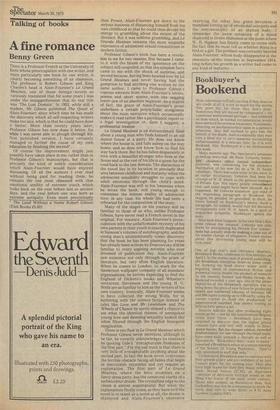Bookbuyer's
Bookend
Most columnists:will tell you that if they deserve any credit at all, it is not so much for the stories they print but for those they don't print. Sometimes they are moved by compassion — for a personal bereavement perhaps — and withhold an item which, in normal circumstances, would have merited the sternest treatment. Sometimes, detecting an uncharacteristic lapse in a person's behaviour, they feel inclined to give him the benefit of the doubt. And occasionally they may turn a blind eye to save someone excruciating embarrassment at a delicate time. So it is with Bookend. Alas, Bookbuyer is a bit disillusioned this week.
Many months ago The Spectator's antennae picked up news that Mr Peter Usborne, former BPC children's editor turned independent putaisner, was contracting for the exclusive distribution of his new list by a W. H. Smith subsidiary. There was some irony in this since, in an earlier incarnation, Usborne had been the scourge of W. H. Smith as the general manager of Private Eye. Not many people remembered that, and some might have been amused. As it happened, Mr Usborne somehow got wind of the impending paragraph in Bookend. He begged, he pleaded, he grovelled; in short, he threw himself on Bookbuyer's mercy. Such a paragraph, he sobbed, would ruin his lucrative arrangements with W. H, Smith. In a spirit of unguarded sympathy, Book buyer spiked the story.
Now look what happens. In his new firm's first press release the unusual Usborne not only starts by proclaiming his Private Eye connections but actually ends by making a joke out of his nimble change of allegiance. Future stories about this interesting young man will be welcomed.
One of last year's less obtrusive imprints, Breakback Books, celebrates its first birthday on April I. In the stormy seas of general publishing, the Breakback enterprise deserves some credit for keeping its head above water with a beguiling blend of experimental fiction and polemical tracts, mostly the product of research by the recently formed Sub-Media Group. As Bookend recorded a year ago, one of the prime objectives of the Breakback operation was to bring down the price of new fiction by producing signed and numbered editions of between 100 and 300 copies (costing up to £30 each), using the excess capital to fund the production of papercovered bunched 'tear sheets' costing as little as forty pence a set.
Sources indicate that after producing eight novels so far — one by the controversial Belgian writer Emil Yttret — Breakback have been surprised to discover that the higher priced volumes have sold very well, mainly to direct postal buyers. But the cheaper edition, intended predominantly for sale through the retail trade, have come sadly unstuck — literally as well as figuratively. "Booksellers didn't want to know" lamented a Breakback editor at a recent meeting of the Soeiety of Young Publishers. "They're only interested in stuff that sells."
Undismayed, Breakback plan to continue with' their present policy and are confident of an Arts Council grant for the coming year. They also have high hopes for their first major reference book, Sexual Soliees (£7.95), an illustrated collection of derivative writings based on the Vling Cho tracts of the early rinth century. Those who suspect, as Bookbuyer does, that booksellers may not be overanxious to stock the work, may care to write direct to 9 St Anns Gardens, London NW5.


































 Previous page
Previous page